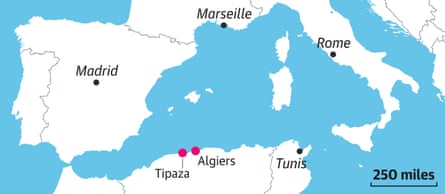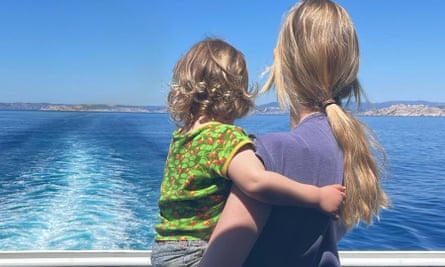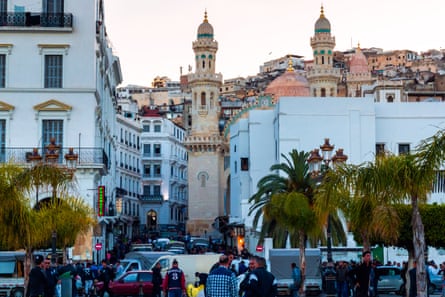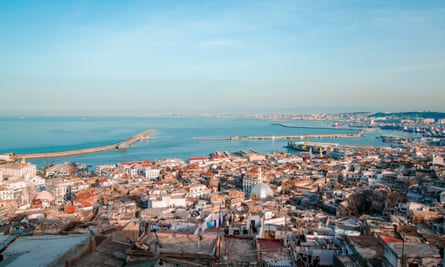Our writer discovers ‘a young, exciting and proud nation’ – little known to western visitors – amid Roman ruins and remnants of war

The journey would have been familiar to British travellers of the 19th century who arrived here by steamship, but these days few foreign tourists come to Algeria. Political unrest since the civil war of the 1990s, the administration’s focus on internal matters and a lack of infrastructure have knocked it completely off the tourist map. So when I was invited as a guest of the British Council Algeria as part of a literary exchange, I jumped at the chance.
My one-year-old son was too young to be left, so I cheekily asked if he could come too. To my delight, the British Council agreed and my capable friend Karen Hinckley accompanied me to help with childcare while I was working. The events were to be on an environmental theme, so it was appropriate to make the trip without flying. Karen and I come from the Orkney Islands, so are undaunted by long journeys.

After a 40-minute dash across Paris to change trains, we boarded the spacious double decker TGV, travelling at more than 150mph and watching as city rooftops turned to vineyards and lavender fields as we headed south.

On the huge Algérie Ferries ship from Marseille, the three of us seemed to be the only non-Algerian or French-Algerian tourists. Everyone else seemed to be experienced in doing the 19-hour journey, those who couldn’t afford cabins bringing air mattresses to bed down in the ship’s hallways. A crowd piled into the glitzy dining room for a dinner of noodles and crème caramel.
An Algerian man talked to us in the lift and seemed surprised or impressed that we were making the journey to Algiers despite “the problems”. I was unsure which problems he was referring to. “Good luck!” he said “There are problems. And it is good.”
This phrase became my personal mantra for the trip. Out on deck at sunset, among Arab men and the smell of diesel and smoke, no land in sight, I was calm. The boat shuddered. The prayer room was full.
On arrival in Algiers we were met by Wahiba from the British Council and taken to our home for the week: the grand Moorish Villa Dar Abdellatif, all whitewashed archways, shady courtyards and tiled roof terraces, high on the west side of the city, gated and guarded 24/7. The villa was an artists’ residence from 1907 and today houses the headquarters of the Algerian Agency for Cultural Outreach (AARC) as well as private guests.

The Algerian students, artists, writers and other interested people who attended my simultaneously translated book events were switched on and perceptive. They were particularly interested to hear about how the genre of “nature writing” is popular in the UK and wanted to talk about the environmental issues that concerned them, including pollution, plastic waste and soil erosion.
One sweltering day, we left the city to visit the Unesco-listed Roman ruins at Tipaza, which include an amphitheatre of red-hued sandstone, with some intact, intricate mosaic flooring. Romans were just one of the waves of settlers in Algeria that included Phoenicians, Ottomans, Spanish and French, all of whom left their mark. A group of Kabyle women – the indigenous Berbers – arrived on a day out, singing and playing drums with joyful ululation, then walked into the sea fully clothed and laughing.
Just beyond the ruins, a memorial to the writer Albert Camus, who was born and brought up in the country when it was a French colony, stands looking out to sea.
Not only had we come to Algeria in a midsummer heatwave – hot even by Algerian standards – but also in the week of the year when the internet had been commandeered for the nation’s baccalaureate exams. As I sat with Wahiba one day, her phone rang and it was my number. I had called her 10 minutes earlier, but it had only just worked its way through various mobile networks and wifi connections. The call mirrored how I felt: strange and dislocated.

During the week there were several moments when, overheated and overstimulated, I feared I had taken on more than I could handle. One afternoon, a fire broke out in the dry grounds of the villa and the tranquil place was suddenly busy with hoses, buckets and extinguishers. Travelling with a child is a responsibility, and my son was so unsettled in the heat and unfamiliarity that I started breastfeeding him again, weeks after having stopped.
On our last day, we took a guided tour of the Casbah of Algiers, the historic citadel area of the city, weaving among steep lanes between the high walls of houses, mosques and palaces. The street markets here sell fruit, vegetables, herbs and spices for locals rather than tourist souvenirs, and musicians played the Algerian mandole under large patriotic murals. We saw the ruins of buildings bombed by the French during the war of independence and places where Algerian fighters hid, as later portrayed in the 1966 film The Battle of Algiers.
Walking up hundreds of steps with my son on my back, I feared heatstroke, but then we reached a rooftop with stunning views of the whole city and were refreshed with mint tea and honeyed couscous as we heard the call to prayer drifting up from all the mosques at once.

It was a huge privilege to visit a country that is not on the tourist trail. We were welcomed warmly everywhere. A curly-haired one-year-old was a connection across language barriers. My son had his cheeks kissed, chased the many cats and ate delicious local cherries and figs. Never on the visit were we able to wander alone; we always had a guide or a driver waiting. There have been kidnappings of western tourists in the country and I was being kept safe, and shown the best of the city, such as the impeccable Botanical Garden of Hamma, where families strolled among fountains and gigantic palms.
I found a young, exciting, proud nation. I loved the way Algerians speak a distinctive mix of Arabic, French and Berber. DJ Snake’s Disco Maghreb was high in the global YouTube charts with a video mixing traditional Algerian culture with modern Arab style and we talked about it with a smart English-language student, Brahim.
Up on the roof of the villa in the warm night, hanging out baby clothes to dry, I looked at the lights of the city and the port, Saharan sand in the air, enjoying the mix of Mediterranean Sea air and African heat. Neither Karen nor I were quite prepared for how different we would find the country. Men and women were mainly separate in public. There were few imported goods in the shops and no bank machines or external postal service. The pace was slower and people were open.

Travelling by train and ferry required a slightly different, slower, mindset, seeing the journey as part of the holiday. Parenting on the road is hard work, but I have to do this stuff – the pyjamas, the nap times, the pasta – wherever we are, so why not do it in interesting places?
It is right to consider environmental impact when travelling to Algeria, as the country is bearing the brunt of climate change. Wildfires raged in the north of Algeria this year, killing a reported 34 people and undermining the forest restoration projects I visited.
Our voyage to lively, hot Algiers felt like an adventure of an old-fashioned kind. It was special to share it with my young son and my old friend and it’s something we’ll always remember. There might have been problems but it was good.
Amy Liptrot is the author of the best-selling memoir The Outrun, which has been made into a film starring Saoirse Ronan and which premieres next month at the Sundance film festival. She travelled as a guest of the British Council. Visitors need a visa from the Embassy of Algeria, which takes a minimum of 10 days. The TGV train from Paris to Marseille takes 3 to 4 hours. Algérie Ferries sails from Marseille to Algiers twice a week (21 to 23 hours). UK-based Lupine Travel runs seven-night group tours of Algeria from £980pp, including accommodation, local transport and guides, but not international travel





